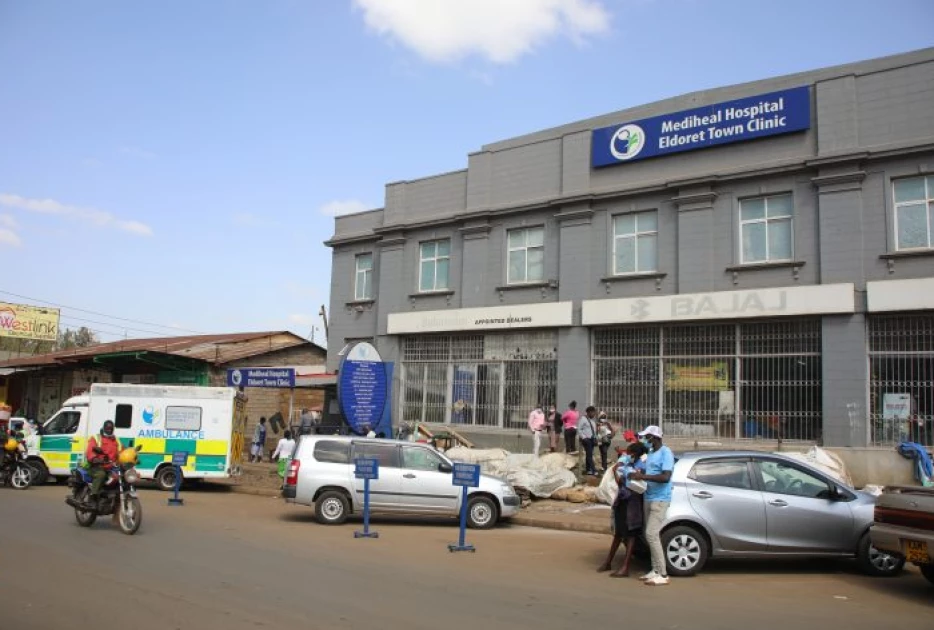Gov’t probe uncovers gaps in kidney transplants at Mediheal Hospital

File image of the Mediheal Hospital Eldoret Town Clinic.
A government-led investigation into Mediheal Hospital and Fertility Centre in Eldoret has unearthed serious gaps in the facility’s kidney transplant program, raising fresh concerns about possible organ trafficking involving foreign nationals.
This comes after a
detailed fact-finding mission by a multidisciplinary team appointed by the
Ministry of Health, following an alert from the global Transplantation Society.
The Society’s
letter, dated July 20, 2023, flagged a suspicious spike in kidney transplants
involving Israeli nationals in Kenya, suggesting the existence of an
international syndicate bypassing local health regulations.
The team - composed
of transplant specialists, ethicists, officials from the Kenya Medical
Practitioners and Dentists Council (KMPDC), the Kenya Blood Transfusion and
Transplant Services (KBTTS), and health ministry representatives - carried out
an on-site audit from December 5 to 8, 2023.
Their mandate -
according to Health Cabinet Secretary Aden Duale - was to verify the claims,
assess Mediheal’s transplant practices, and provide concrete recommendations.
The team
established that the hospital, a licensed level 5 private facility, had
performed 372 kidney transplants over five years, mostly for patients from
Kenya and the East African region, with some from countries as far as Israel,
Australia, Japan, the USA, and the UK.
CS Duale noted
that, while Mediheal had embraced modern techniques - conducting 99% of its
surgeries laparoscopically and maintaining consent records for all sampled
donors - investigators found a string of concerning issues.
One such issue was
weak donor-recipient verification, whereby the hospital could not provide
adequate documentation to prove biological or relational ties between donors
and recipients, especially in cross-national pairings.
“All the Human Leukocyte
Antigen (HLA) tests that enables distinction of ‘self’ |and ‘non self’ were
done in India without the requisite approval of MOH for shipment of human
samples outside the country,” stated CS Duale in a statement to newsrooms on
Tuesday.
The team also found
that language barriers were ignored as several donors and recipients who could
not understand English were presented with untranslated documents, thereby undermining
informed consent.
“There were high
risk transplantations including for a patient with confirmed prostate cancer
and extremes of age. Transplants were conducted despite poor donor-recipient
compatibility,” added Duale.
“The facility
lacked clinical morbidity and mortality reports. The hospital did not have
multidisciplinary team (MDT) committee meetings.”
The investigation
stopped short of confirming direct involvement in organ trafficking but found
the allegations credible enough to warrant further scrutiny by law enforcement
and relevant agencies.
The investigative
team has called for a sweeping overhaul of Kenya’s transplant governance,
including the development and rollout of national standards and clinical
guidelines for transplant services.
“The Ministry of
Health to develop a legislative and regulatory framework to safeguard against
organ trafficking and transplant tourism. National Standards and Regulatory Frameworks
in transplant services will seal legal loopholes that can be exploited to allow
for clandestine unregulated transplants,” noted the Health CS.
“All donor and
recipient evaluations to be presented to a multi-disciplinary committee. MDTs
needs to be operationalized/ made functional and the hospital management to
reconstitute the ethics committee to include interpreters who can clearly
communicate with the recipients and donors, a patient advocate and experts not
directly involved in the transplantation.”
Duale added: “The
audit realized that there was need to strengthen the donor recruitment process
and consenting by involving and documenting family member conferences. This
will involve documenting a list of family/people talked to and anyone who participates
in the transplant process for accountability and transparency. The due
diligence and duty of care must be upheld by all health care providers as they
administer their services.”
The team further
recommended the establishment of a centralized registry for all transplant
recipients and donors, especially foreign nationals, complete with verified
documentation of their relationships.
They also want a strengthened
donor consent process, with documented family involvement to ensure
transparency and accountability.
In response, CS
Duale said the Ministry of Health has already developed transplant service
guidelines and a draft policy on the use of blood, cells, tissues, organs, and
other human substances.
He said the ministry
also plans to conduct a follow-up audit at Mediheal Hospital to evaluate
compliance, and launch nationwide audits of all seven transplant facilities in
Kenya to ensure uniform standards.
Want to send us a story? SMS to 25170 or WhatsApp 0743570000 or Submit on Citizen Digital or email wananchi@royalmedia.co.ke
Comments
No comments yet.



Leave a Comment